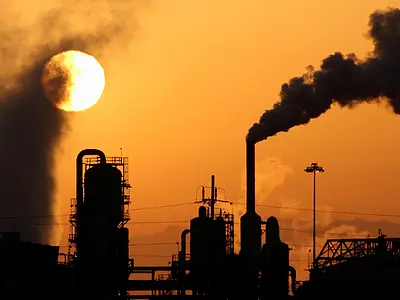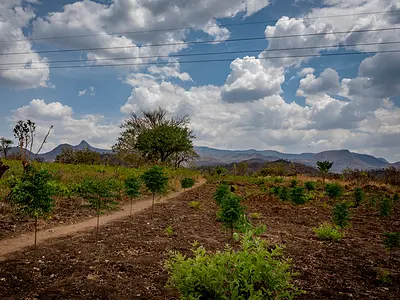Leveraging understanding of greenhouse gas emissions to inform climate policy analysis
The foundation of any climate policy analysis is a proper understanding and accounting of existing sources of emissions. Our engineers have extensive experience developing and maintaining greenhouse gas inventories that are comprehensive in their coverage of sources, sectors, and gases. RTI’s subject matter experts work closely with our clients to build richer understanding and systematic tracking of greenhouse gas emissions activity from natural processes, industrial processes, fossil fuel combustion, and other sources.
Greenhouse gases (GHG) come from every corner of our economy, so policies to address them will influence the relative costs of goods and services throughout the economy. Household and government consumers respond to these changes by adjusting their expenditures to avoid or take advantage of energy price changes. Wages and returns to capital may change as a direct result of energy costs or indirectly from shifts in consumption. GHG policies can also induce higher levels of near-term investment or early retirement of existing energy equipment. The economic impacts of decarbonizing our economies are myriad. Our experts integrate their broad set of disciplinary trainings to tackle emissions across several key sectors.
Natural and Working Lands
As a considerable source of greenhouse gas emissions this is an important sector for mitigation. It is also important to food security, ecosystem services, and contributes significantly to rural economic well-being. Our team of environmental scientists and economists draws on biophysical modelling in forestry and agriculture, geospatial analysis, and economic simulation modeling to evaluate the interactions of natural and working lands to GHG emissions and carbon sequestration. RTI has extensive land-use modeling experience, working closely with federal researchers and academic collaborators on projects ranging from regional assessments to global, multi-model analyses that account for a variety of factors that drive spatio-temporal heterogeneity in carbon fluxes. Our team specializes in feedstock production and processing for bioenergy, land use sectors’ climate change impacts, and evaluating the economic and environmental outcomes of alternative GHG mitigation policies on the agricultural and forestry sectors.
Electric Power
RTI's air quality engineers have decades of experience providing electric power emissions rate estimations and pollution control technology physical and cost characterizations. Having contributed to the development of exhaustive documentation of control technologies, RTI's engineering team offers our clients a nuanced understanding of the physical and economic tradeoffs associated with change-in-process and post-combustion pollution control strategies, and our water resources team understands the importance of hydropower in grid environmental trade-offs associated with renewable energy. RTI economists build on the rich techno-economic detail our engineers develop to simulate power market dispatch and capacity expansion behavior in our economic models within the complex of physical and policy constraints electric utilities and system operators face. Our integrated team provides our clients with deeper insight into the future of fossil fuels, GHG and non-GHG pollution from electric power generation.
Transportation
RTI economists have supported characterizing vehicle stocks, assessing consumer willingness to pay for vehicle attributes, projecting technology adoption, and simulating transportation service demands across all modes of transportation. Our experts understand the costs and performance characteristics of different light and heavy-duty road vehicle power trains using our global ADAGE economy-wide model. We have also supported our clients in analyzing marine and rail transportation fuels and emissions scenarios.
Industry
RTI engineers have decades of experience quantifying and characterizing air emissions and pollution control technologies for petroleum refineries, cement manufacturing, iron and steel foundries, and waste facilities including both combustion and process emissions sources. Our engineering and economics teams have supported our clients in identifying greenhouse gas abatement activities and their associated costs and quantities for a wide array of industrial, agricultural, and commercial sectors. Our energy economists have helped government and industry identify the adoption determinants of new energy-using and management technologies.
Waste
Our experts prepare the US GHG inventory and support the US GHG Reporting Program for the solid waste sector. RTI’s multi-disciplinary staff conduct cost and engineering analyses of strategies and technologies for mitigating GHG emissions for waste operations including landfills, composting, anaerobic digestion, and emerging technologies (e.g., gasification and pyrolysis). RTI’s municipal solid waste decision support tool (MSW DST) developed in cooperation with EPA has been used extensively to support community decision makers and solid waste planners in assessing the cost and life-cycle environmental impacts (including GHGs) for municipal solid waste management strategies. We provide expertise to support clients in the characterization and mitigation of GHG emissions from municipal waste, livestock waste, and wastewater management.
Related Projects
Modeling the Effects of Carbon Taxes on U.S. Household Incomes Using RTI ADAGE™
Read More about Modeling the Effects of Carbon Taxes on U.S. Household Incomes Using RTI ADAGE™












